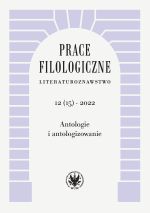O długim trwaniu antologii na przykładzie „Speculum exemplorum”
On the Longevity of Anthologies: The Case of "Speculum exemplorum"
Author(s): Magdalena PiskałaSubject(s): History, Language and Literature Studies, Studies of Literature
Published by: Wydawnictwa Uniwersytetu Warszawskiego
Keywords: anthology; Neo-Latin literature; translation; Old Polish literature; preachers’ compendium
Summary/Abstract: The article discusses a long-standing presence of three Neo-Latin anthologies. The popularity they enjoyed across Europe throughout the whole early modern period can be attributed not only to their content but most of all to the usefulness that stemmed from a clear and intelligible structure that enabled readers to find the subject matter they were looking for with hardly any effort. The most popular anthologies of quotations such as "Manipulus florum" by Thomas of Ireland or "Polyanthea" not so much endured in more or less the same form as a result of consecutive editions but rather lived as a consequence of changes made by their successive editors who kept supplementing and amending the content, modifying the composition and making the anthologies more and more orderly by adding new practical indices. One striking example of this is a preachers’ compendium "Speculum exemplorum". Despite its medieval origin, it re-emerged and gained popularity thanks to its 17th-century editor, the Jesuit Johannes Major. Being continually published, altered and expanded, it gained yet another life through Szymon Wysocki’s translation into Polish. This particular edition led a life of its own and following its new editions and further publications, it became a significant and a long-lasting phenomenon in the Old Polish literature that inspired further adaptations in the East Slavic languages.
Journal: Prace Filologiczne. Literaturoznawstwo [PFLIT]
- Issue Year: 2022
- Issue No: 12 (15)
- Page Range: 45-59
- Page Count: 15
- Language: Polish

